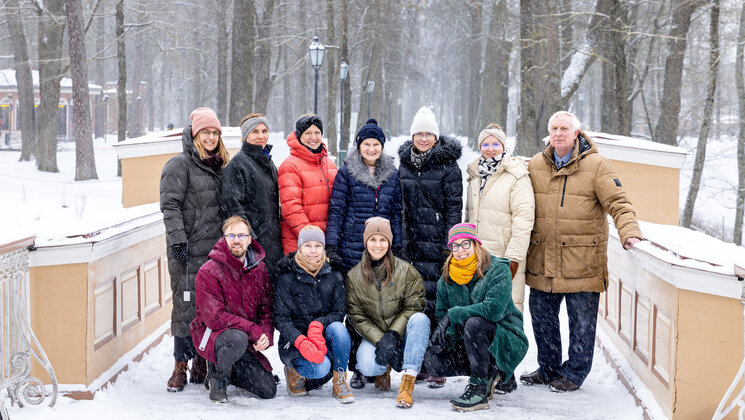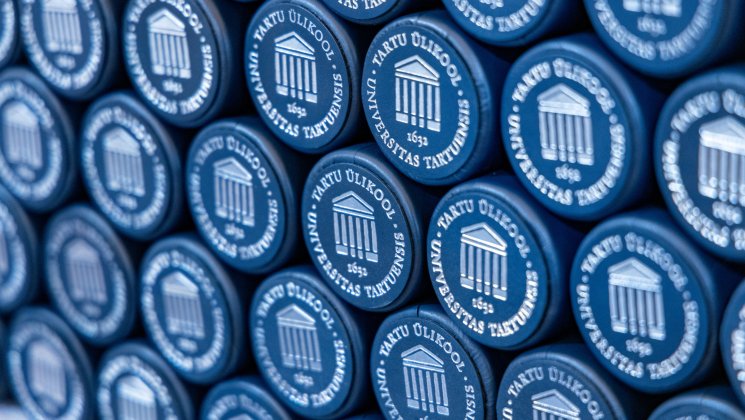Rector: we have agonisingly little time to prepare for future
Rector Toomas Asser's speech at the ceremony dedicated to the 105th anniversary of the Republic of Estonia on 23 February 2023 at 12:00 in the assembly hall of the University of Tartu
Dear mayor, members of the university, friends and colleagues,
"We have hardly ever lived in more anxious days than these. The situation in which we find ourselves is dark, even unimaginable." These were the words of Rasmus Kangro-Pool, a student of the University of Tartu, in the daily Postimees on 23 February 1918.
This newspaper, published exactly 105 years ago, wrote about the retreat of Russian troops and the arrival of German occupation troops. It described how the Bolsheviks had deliberately spread wild rumours among the people, taking advantage of the information vacuum that had lasted for several months, during which newspaper printing had been forbidden. Postimees, which had resumed publication on 22 February, comforted the people and gave clear instructions on letting the Bolsheviks go and getting through the German occupation.
We know that at the time of printing this number, the Estonian Declaration of Independence was already circulating in Estonia. Although it was first read out on 23 February, for the past 105 years, it has been 24 February that has held a special place in the hearts of Estonians.
365 days ago, this place in our hearts was torn open. The shock that struck us on the morning of Estonia's birthday continues to this day. But this war has pushed us to act with all our means, more vigorously than many larger countries. While the student Kangro-Pool wrote 105 years ago that Estonians "have not been given the role to untie the knots of world politics", today we can say that we have won this position in the eyes of the world.
It goes without saying that we continue supporting Ukraine. We cannot stop until the aggressor has been defeated and also punished under international law.
At the same time, we must also attend to our country and our people so that we could go on when the current fight for the values of the free world is over. The recently published Human Development Report also emphasises that although Estonia has reached the ranks of well-off countries, the mental health of our people and our preparedness for future crises depends on how safe we feel in Estonia, how much we trust our country and how much we trust our compatriots.
In just a few days, we will have to make an important choice on the future course of the Estonian state. It will be the responsibility of the new, 15th composition of the Riigikogu to ensure that the long-term goals chosen so far are met. It will be up to the next leaders of the state whether the inevitable but difficult changes will be implemented in Estonia, whether this will be done with public support or opposition, and whether the decisions will be based on the short-term expectations of some interest groups or the durability of Estonia through time.
When the University of Cambridge celebrated its 800th anniversary, 800 people worldwide were selected to write a letter to the future. One of the authors was the then Rector of the University of Tartu, our current President Alar Karis. The world will know what this letter says only in the year 2109, but we do know that it was written to a student who will study at the university 100 years from now, and it was written in Estonian. Thus, Alar Karis's letter carries the hope that in 100 years' time, the fear of the Estonian language regressing to a mere kitchen language will not have come true.
In 1971, Professor Rein Taagepera, who celebrates his 90th birthday next week, also wrote a letter to the future. He wrote down a very precise 30-year plan for Estonia, a description with an action plan of what Estonia, then part of the Soviet Union, should be like on the threshold of the 21st century and what should be done to achieve it. Taagepera's description of the future fits in very well with the image of today's free Estonia. Of course, it includes some ideas characteristic of its era that we could not agree with today. After all, every plan reflects the face of its time and needs to be adapted to real life.
Even today, Estonia has its letter to the future – a plan for 2035. Estonia's long-term development strategy is our generation's public pledge to the next generation and ourselves that we will work for the future prosperity and good health of the land, country, culture and people we hand over to the next generation by 2035.
The young people at their prime working age in 2035 are those who can vote in their first elections to the Riigikogu next week. I hope they will use this opportunity with great responsibility, realising that they are responsible for their future beyond choosing their career after secondary school.
The people who complete their upper secondary education, hopefully go to university and vote in their first elections to the Riigikogu in 2035 are taking an important step this autumn – they will enter the first grade. So those currently in charge of Estonia's life have only 12 years to make the necessary changes in every area of society. A dozen years may seem like an eternity for the child starting school, yet it is an agonisingly short time to implement the green transition, to find and apply a new model for operating as an ageing society, to adapt to climate change and migration.
The state of Estonia in 2035 will be the result of the actions and inactions of every one of us. This takes me back to the university.
In his 30-year plan, Rein Taagepera wisely pointed out that, as a small nation, we have to choose what to specialise in, because doing a little of everything would result only in high-level mediocrity. True to his era, when discussing what growth should receive support, he proposed developing oil shale technology. Nowadays, we are talking more and more about hydrogen technology, biotechnology, and gene technology, but Taagepera's point can also be applied to these areas: developing the technology of the future is an expensive endeavour, but it would be even more expensive to train our own scientists and then fail to make maximal use of their abilities. It is even worse to let the rest of the world get the top performers in whose development we have invested so much. In Estonian, Rein Taagepera aptly referred to such brain drain as "aju-haju".
So we need to create the conditions for our people to want to stay here and devote themselves to both their specialisation and Estonia. This requires creating and fostering an international operating environment within the university, as well as bringing top-level international researchers to Estonia. We already have the necessary leaders in Estonia, as evidenced by the fact that University of Tartu researchers recently received the largest research funding in the university's history to establish two international centres of excellence in Tartu. To retain these and other researchers with similar future potential, it is not only the university that must have the wisdom, but also the Estonian state. It also implies a serious consideration of whether it makes sense for the government to spread research and development and innovation money across many small institutions or whether we can achieve better results than "high-level mediocrity" through the well-targeted strategic use of money.
As said in the Human Development Report mentioned above, part of the wisdom of preparing for the future is to reduce uncertainty. Since research and teaching are the two main prerequisites for achieving this, research and research-based higher education will determine the kind of Estonia in which our future adults who start school this autumn will live. Let us do our best.
May the Estonian state and its national university live, grow and flourish!
Find more to watch:
- WATCH THE RECORDING: Ceremony and concert dedicated to the 105th anniversary of the Republic of Estonia
- Margit Keller: The six pillars of sustainability
- Professor Peeter Tulviste Memorial Fund scholarship awarded to Dmitri Rozgonjuk
- Student Renar Kihho: we must ensure that education is protected
- Recipients of University of Tartu annual awards have been announced
- Recipients of the teaching staff of the year awards have been announced
- University's Ukrainian community invites the university family to commemoration events on 24 and 25 February






